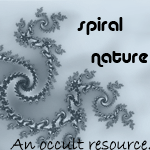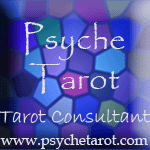Occult Profiling: Where it comes from and why it’s worth fighting
By Beth Winegarner | March 24, 2010 | Print This Post | E-mail This Post | 9 Comments
Beth Winegarner is an author, journalist and sociologist who is working on a guidebook for parents about teen culture. For more on her work, visit bethwinegarner.com.
 For the past couple of years, I’ve had a Google Alert set for the word “Satanic.”
For the past couple of years, I’ve had a Google Alert set for the word “Satanic.”
I created it because I wanted to study how media use the word. Every day, news stories and links containing the word “Satanic” wend their way to my inbox. They range from articles about Salman Rushdie (all of which mention The Satanic Verses) to pieces about Toyota recalls, calling sticky gas pedals “Satanic.”
However, many are articles about crime. Big, gory, violent crime, and petty graffiti depicting pentagrams and other symbols.
A few weeks ago, a news article from the Agence France-Presse news wire described how nine Chilean men in black robes were detained for slitting the throats of several cats in a supposed Satanic ceremony. But the article doesn’t describe the crime in enough detail – nor does it clarify how this instance of animal abuse is connected to Satanism.
In early February, a Brooklyn arsonist was called “Satanic” by local press because he said Satan told him to set the fire that killed five people. Reporters failed to explain (and perhaps comprehend) the difference between Satanism and schizophrenia.
Seventeen years after three teens from West Memphis, Arkansas, were convicted of murdering three young boys in a “Satanic” ritual – despite the fact that there was no sign of actual occult activity — newspapers are still using that adjective to describe the crime. Many believe the former teens were wrongfully convicted because, in a small Southern town, wearing black clothes and listening to Metallica is enough to make locals think you’re capable of murder.
In all three cases, readers are left with the impression that Satanists are violent people, or that Satanists are people who commit violence in the name of their spiritual pursuits. In fact, Satanists and occultists rarely commit crimes, and those that do are generally motivated by their mental condition – not their spirituality.
Some Satanists are happy to explain. But reporters rarely, if ever, think to consult them while covering so-called “Satanic” crimes.
“Distortions that circulate about occult groups [include] the ‘Exorcist-Rosemary’s Baby’ view put forth by much of the press and by fundamentalist Christian groups. Witchcraft or occultism are engaged in something fearful, pernicious, illegal and immoral. This image has a long history. It is nourished by the media because it sells,” wrote journalist Margot Adler in Drawing Down the Moon.
In general, occultists know this. However, the general public doesn’t. In part, that misconception comes from television and newspapers. The more the media play up this connection between the occult and violent crime, the stronger the cultural association becomes.
After a while, it becomes a kind of profiling. Unfortunately, it’s a kind of profiling I have seen many occultists embrace. While racial minorities fight similar stereotyping that pegs them as criminals, a significant number of occultists prefer to be viewed as scary or dangerous. Some were guided into their spirituality out of a desire to stand apart from the mainstream. A reputation for trouble only seals that separation.
In Cop’s Guide to Occult Investigations, Tony Kail describes a boy who isn’t even involved with the occult, but who uses the “dangerous” stereotype to his advantage by carrying a copy of Anton LaVey’s The Satanic Bible
: “’I don’t even know what it is about. I just know that it scares people. I used to get beat up by these guys in my class, but ever since I started carrying that book around, nobody messes with me!’ Using the occult as a security blanket is very popular. I have had teachers, parents and even police officers tell me that they were scared to deal with juvenile occultists.”
Kail is one of at least two police officers who have written books debunking the idea that occultists are criminals, and to help police understand what they’re seeing when they enter a crime scene littered with pagan paraphernalia.
In In Pursuit of Satan: The Police and the Occult, Robert Hicks describes how news reporters get their misinformation about so-called occult crimes from police. Police, in turn, learn what they know from seminars – and the information disseminated at those seminars comes from conservative Christian sources.
“Cult officers employ fundamentalist rhetoric, distribute literature that emanates from fundamentalist authorities, and sometimes offer bibliographies giving many fundamentalist publications,” Hicks writes. “Further, cult cops sometimes team up with clergy to give Satanism seminars.”
At the same time, police are discouraged from studying primary sources on the occult, according to Kail. “One law enforcement guide warns: ‘Intense study of resource books and materials by occult sources is hazardous. Preferred is studying overviews and synopses by credible authors who have studied the occult traditions. The unknown realm of the occult beckons with many lures. Study and/or experimentation are to be avoided. There are safer ways to test for poisonous chemicals than by tasting them.’”
In other words, those tasked with enforcing the law, arresting citizens suspected of crimes, and seeing them convicted of those crimes in court, are learning what they know by listening to fundamentalist Christian “experts” – without any balancing perspectives.
That means if a murder happens in a small town, on a full moon, and the police can’t find anyone to pin it on, they may go for the nearest black-clad person wearing a pentagram or carrying a copy of a book by Aleister Crowley. That’s likely what happened to the West Memphis Three, who have spent nearly half their lives in jail (one of them on Death Row) despite new DNA evidence that absolves them of any association with the crimes.
Some occultists might think it’s fun to “freak the normals,” but such stereotypes can harm those who just want to practice their spirituality quietly, without facing backlash. It can also harm those trying to find work, trying to get into the school of their choice, or trying to avoid problems with the police.
If this were happening to another group – say, African Americans or women — someone would take the situation to the American Civil Liberties Union or another group that protects the public from prejudice. The consequences of profiling, especially police profiling, can be devastating. So why aren’t occult groups, Satanists in particular, doing more to fight back?
Most occultists can’t serve as expert witnesses during trials, or provide consulting to local newspapers or police departments. But they can write letters to news outlets when we see the occult being misrepresented, and they can help fill in the gaps in conversation when they hear any aspect of the occult being explained poorly. They can talk to reporters when vandals paint a pentagram on a church door or a preschool.
There’s a massive amount of public misunderstanding to overcome, and that can seem insurmountable. But doing nothing – or, worse, encouraging the public to associate occultists with danger – risks livelihoods. And freedoms.





“In fact, Satanists and occultists rarely commit crimes,”
Rarely, or not more so than the general population?
“and those that do are generally motivated by their mental condition – not their spirituality.”
How do you draw a meaningful distinction there?
“If this were happening to another group – say, African Americans or women — someone would take the situation to the American Civil Liberties Union or another group that protects the public from prejudice.”
Any competent lawyer is capable of making a case on the grounds of religious discrimination, ad at least as far as the ACLU goes this is often why they are not involved in a given case.
You’ve already pretty clearly defined why Satanists in particular won’t take those actions, in as much as you can call it a spiritual practice, part of that practice and belief (in a very general sense)is the idea that it is virtuous to be misunderstood by the mainstream, and an emphasis on the virtue of the individual that makes Rand look like a communist. To say to a satanist, why don’t you try to become a more integrated member of society, or organize so you can have the power of numbers, seems to rather miss the point of Satanism.
After all, as I would hope you’d e aware LaVey, who tragically has more of an influence on modern satanism from his grave than does Baudelaire, specifically notes that a Satanist should encourage rather than disabuse someone of the illusion that they are raving devil worshiping sex fiends. Really, it’s one of the few charming parts of the ideology.
More to the point, if someone is not a Satanist, you are not discriminating against them for being a satanist…so merely describing something as satanic doesn’t constitute any sort of legal violation of church/state issues. It might be bigoted, but so is saying all women are whores, or all blacks are thieves. While people who utter such things should be confronted it’s still in and of itself protected speech. Which is my largest observation here, that much of the kind of thing you speak about here is not a matter to be legislated away but to be confronted in much the same way say feminists drew attention to sexism inherent in language. It is a battle fought in the culture, not the courts.
And after all, Satan as an idea is not the sole province of Satanists either..wouldn’t you say it constitutes a violation of free speech to say Christians can no longer use the word satanic in a pejorative way? Could it not even be regarded as an attack on their religious freedom?
Lastly, while I can certainly observe the case of the West Memphis Three being an abortion of justice..when it comes to the actual beliefs of Satanists…Not two years ago I sat and listened to a highly respected member of the Satanist community lecture on a device he was building that (his words and claims)would use “black radionics” and was capable (and really specifically designed for) killing individuals or instigating apocalyptic destruction.
While I certainly doubt the veracity of these claims, it’s worth noting that with few exceptions, the audience full of occultists and satanists applauded his art and tittered away at his evil genius. This in a situation where no one was there to “freak the normals” but to enjoy the company of their fellow freaks.
In other words I think it’s fair to say that when a primary interest is in posing as though you were a psychopath, you do not magically deserve protection from being treated as though you were what you spend your life pretending to be. This isn’t to say I’m arguing for legal ramifications (I’d be considered an occultist myself after all) but within the bounds of reason,I reserve the right to be highly critical and publicly so of people who behave that way.
As a disclaimer I will note that there was a time when such adolescent ideas a the “ragnarok engine” would have made me giddy as well, indeed even a time when I counted myself a Satanist….but concerning those who hold these ideas, not as a clever sub cultural pose where misanthropy is a fashion statement, but who hold these ideas as seriously and as religiously as a Mormon believes they get to rule their own planet, or a Catholic believes spirits can impregnate women, or that an Evangelical Baptist thinks it’s possible for a man to live inside a fish…
Again, while I’d never call for the imprisonment or physical harm of these people, I do absolutely reserve the right to condemn and ostracize anyone possessed of and pedaling such an unethical and anti-human ideology. To treat them as dangerous individuals and in short treat them with the same scorn that I hold for those of the Abrahamic Faiths that fetishize the destruction of human life and indeed of the world because it is a part of their spiritual beliefs.
Two things:
One, I am not advocating any kind of legislation. What, in this piece, led you to believe that?
Two, I’m aware that there are Satanists (and other occultists) who want to be seen as psychopaths. However, there are black-wearing teen Wiccans who DO NOT WANT to be seen as psychopaths, but wind up being seen that way because we haven’t done enough to highlight the differences, and pop culture winds up ascribing the attributes from the former to the latter. The former can deal with the consequences of his or her reputation. The latter shouldn’t have to.
Yes – so much – to this especially. It’s why I’ve taken to using a pseudonym online for the past fourteen years. I fear my career prospects would be limited by association with the very things you’ve mentioned.
On the flip side, I’ve frequently encountered other occultists who were surprised that I held down a stable job in banking for the past six and a half years with a reasonable title (senior business analyst), that I wasn’t a starving artist or otherwise marginalized in my day-to-day life.
So many occultist self-marginalize as well. Not only by “freaking the normals”, but by maintaining a separation between what they do and who they are in ritual, and who they are at the office. What are your thoughts on how this affects our perception?
I think it’s OK to practice quietly and keep one’s spirituality out of the workplace — that was my choice, too. (I wish pretty much everyone would keep spirituality out of the workplace, honestly.) Granted that does little to broaden people’s perceptions, but the professional environment isn’t necessarily the place for it, I don’t think.
I also think it’s OK for those who want to be “out” at work to do so. They may have to deal with some repercussions. They can be ambassadors of their beliefs — and if they get fired for those beliefs, they have something they can take to court.
I’m more referring to using my full legal name when writing about this stuff, which would be easily Google-able. It worries me to do so because I think it could hurt my job prospects, my professional reputation.
Thank you very much for this well-written article concerning the continued misconceptions about terms like “Satanism” and “the occult”. I am less concerned about reports from non-western countries, which may commonly use these words differently than we do, and which probably have far fewer legitimate Satanists and occultists.
However, I find the continued fear over these terms in, say, the United States to be downright embarrassing. Information on these topics is fairly available to anyone interested in basic fact-finding. But these people are simply lazy. Either rumor is good enough for them, or they actually enjoy promoting the idea of evil conspiracies being in existence to prey on us.
I can’t count the number of times I’ve seen someone talk about how the Satanic Bible gives instructions for human sacrifice, mocks the Christian Bible, commands readers to commit crimes, do drugs, have orgies, rape children, etc; or is the dictates of Satan just as the Christian Bible is the dictates of God. No one who has actually read the Satanic Bible would make any such claims, regardless whether or not they agreed with the teachings of LaVeyan Satanism.
There’s enough evil in the world. Why invent more bad guys rather than fight some of the truly terrible things happening in this world?
[...] ahrfoundation: Occult Profiling: Where it comes from and why it’s worth fighting [...]
[...] this week we had a guest post by Beth Winegarner – author,1 journalist and sociologist who is working on a guidebook for [...]
[...] Occult Profiling: Where it comes from and why it's worth fighting … [...]